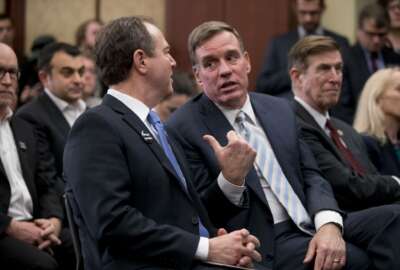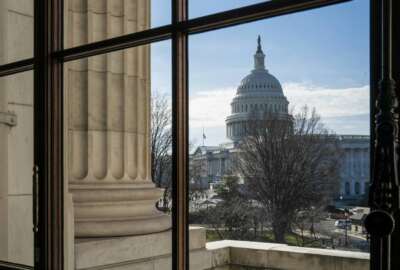

Federal contractors said the recent government shutdown was marked by confusion, lack of communication and unclear guidance from agencies about their...
The longest government shutdown in U.S. history prompted some lawmakers to optimistically suggest Congress should find a way to prevent such an event from ever happening again.
But the prospects of eliminating government shutdowns for good are unlikely, at least at this point, leaving Congress to find piecemeal solutions to alleviate the impacts ahead of a future lapse in appropriations.
The House Oversight and Reform Government Operations Subcommittee on Monday heard stories from nearly a dozen federal contractors, who described how the 35-day government shutdown impacted their businesses and employees. Contractors largely said the most recent lapse was marked by tough decisions, confusion and a lack of communication and inconsistent guidance from the government.
A few contractors used words such as “abominable, insanity and uncertainty” to describe the experience. But all of them said the impacts of the recent shutdown extended well past 35 days.
For Leidos, a Fortune 500 company, 893 of its employees had no or limited work to perform during the government shutdown, because they were on contracts for closed agencies, CEO Roger Krone told the subcommittee.
The company lost $14 million in revenue during those 35 days and experienced a delay in payments on outstanding invoices, which totaled about $18 million.
Leidos’ work on 22 programs came to a halt during the government shutdown, which impacted about 200 of its subcontractors, Krone said.
It also allowed those employees to advance paid leave hours up to a balance of negative 80 hours. Nearly 400 Leidos employees used up all of their vacation time and then some.
“It will take them years to build back that base of paid time off that they had prior to the shutdown,” Krone said during the subcommittee’s field hearing at George Mason University.
In addition, Leidos launched a special relief initiative to allow other employees to donate paid time off to their colleagues impacted by the government shutdown. More than 50 employees said they were in state of extreme financial hardship and needed additional assistance. These employees received a grant of $2,500.
“If the shutdown were to have continued any longer, we anticipated receiving another 100 requests each week for assistance,” Krone said.
Leidos also set up specific team to redeploy impacted employees to open positions on contracts for agencies who weren’t impacted by the government shutdown.
But some contractors couldn’t redeploy their employees to work on other contracts that weren’t impacted by the shutdown, because that work required a specific security clearance their employees didn’t have, or it would have simply taken too long to receive those credentials.
Citizant, a small business that employs 180 professionals and supports the IRS, DHS and the departments of Defense and Justice, couldn’t redeploy its 35 employees who were impacted by the government shutdown to other work.
The company did continue to pay its employees during the shutdown, but that decision came at a cost.
“When your only customer doesn’t pay you for nearly four months and you’ve reached your company’s borrowing capacity, you face the dire prospect as a business owner to file for bankruptcy or sell off parts of your business for pennies on the dollar in order to pay your employees,” Alba Alemán, Citizant’s CEO, said. “We were within days of having to make that decision.”
Outstanding invoices piled up until March, which put Citizant $4 million in debt. Alemán said her company also maxed out its borrowing capacity and put off paying its own vendors until April.
Other companies have also experienced a delay in receiving payment for outstanding invoices after the government shutdown, said David Berteau, president and CEO of the Professional Services Council.
“As of two weeks ago, we still had member companies who had not had invoices paid from work done before the shutdown. Those invoices were still being reviewed and processed. That goes back to invoices filed before Dec. 21 for work done and paid for before Dec. 21. That’s not common, but it’s not out of the question.”
Confusion reigned large during the government shutdown for many of the contractors.
Advanced Concepts and Technology (ACT 1) had two large contracts impacted by the shutdown at the Department of Homeland Security.
One contract was up for year-long option during lapse. The contract expired during the government shutdown, and the department didn’t have a contracting officer available to execute the option.
“They weren’t able to execute our option, so we basically moved off contract and couldn’t show up in the offices,” said Michael Niggel, the company’s CEO. “Our customer was frustrated with us because we weren’t there and other contractors were. They had funded contracts, but we did not.”
Now, ACT 1 has heard two different legal opinions from DHS about what should happen next.
Rep. Gerry Connolly (D-Va.), the subcommittee’s chairman, suggested the contractors, led by PSC, develop a list of simple solutions that could resolve these challenges ahead of future shutdowns.
“Certainly one of them is to have some kind of provision in law that says during a shutdown, the expiration is on ice, so you don’t lose the contract simply because the contracting officers aren’t there,” Connolly said.
The contractors also suggested Congress consider a specific provision that allows work on a specific contract to automatically restart once the lapse in appropriations ends — as well as other measures to provide more clarity on stop work orders altogether.
“The head of procurement at DHS specifically sent a memo to all contracting officers saying unless you issue or your contractor is issued a stop work order, and as long as you don’t need guidance from the government to keep doing your job, leave it alone, walk away and let them keep doing their jobs,” Alemán said. “The problem is they sent the notice the day after the shutdown. They were no longer able to read their emails, so they didn’t know that. They shut us down temporarily. We got a copy of the memo because one customer that was working sent it to us. We sent it to [DHS] and they logged in and said, ‘Yup, keep working. You’re not on a stop work order.'”
Just as many federal employees weren’t clear if they would be eligible to receive unemployment benefits during the government shutdown, federal contractors had similar questions.
“Most of our members were too confused,” said Ed Grabowski, a local president for the International Association of Machinists and Aerospace Workers union. “Were they eligible for it because they were furloughed and they didn’t actually receive a lay off notice? So they weren’t astute enough to [know] how to apply. If I do take personal leave time, am I still entitled to collect unemployment compensation? … We had a problem with communication.”
Members of the International Association of Machinists and Aerospace Workers are helicopter pilots, lab technicians and crane operators for agencies like NASA.
“This confusion at least, it seems like we could help eliminate that,” said D.C. Del. Eleanor Holmes Norton. She, along with Reps. Don Beyer (D-Va.) and Jennifer Wexton (D-Va.) said there were opportunities for Congress to provide more clarity ahead of future lapses.
Contractors and other businessmen who were affected by the shutdown said the lapse had an impact on their staff and their ability to recruit new talent.
Wesley Ford, president of TKI Coffee, said he lost a significant amount of revenue during the government shutdown. His store is located near several agencies who were closed in January, and explicitly decided to lay off 40 percent of his staff during the shutdown so they could receive unemployment benefits.
At least 35 security officers who worked for one of the shuttered Smithsonian museums during the government shutdown quit, said Jaime Contreras, vice president of a Service Employees International Union (SEIU) local in the national capital region.
And Alemán said several of the senior-level DHS employees that Citizant worked with on their contracts left during the government shutdown.
Some of PSC’s member companies told Berteau their recruits had canceled interviews during the government shutdown.
“They’ll never get that back,” he said.
Copyright © 2025 Federal News Network. All rights reserved. This website is not intended for users located within the European Economic Area.
Nicole Ogrysko is a reporter for Federal News Network focusing on the federal workforce and federal pay and benefits.
Follow @nogryskoWFED


